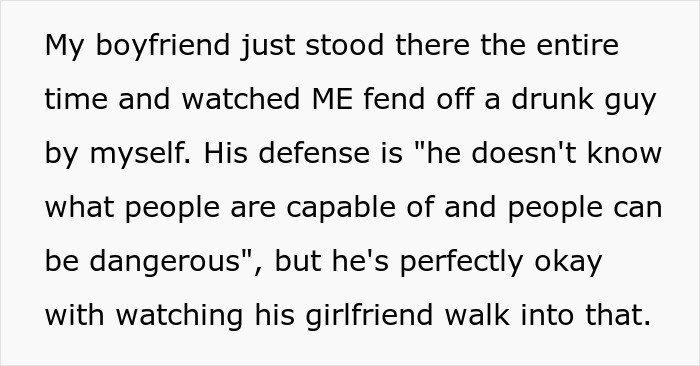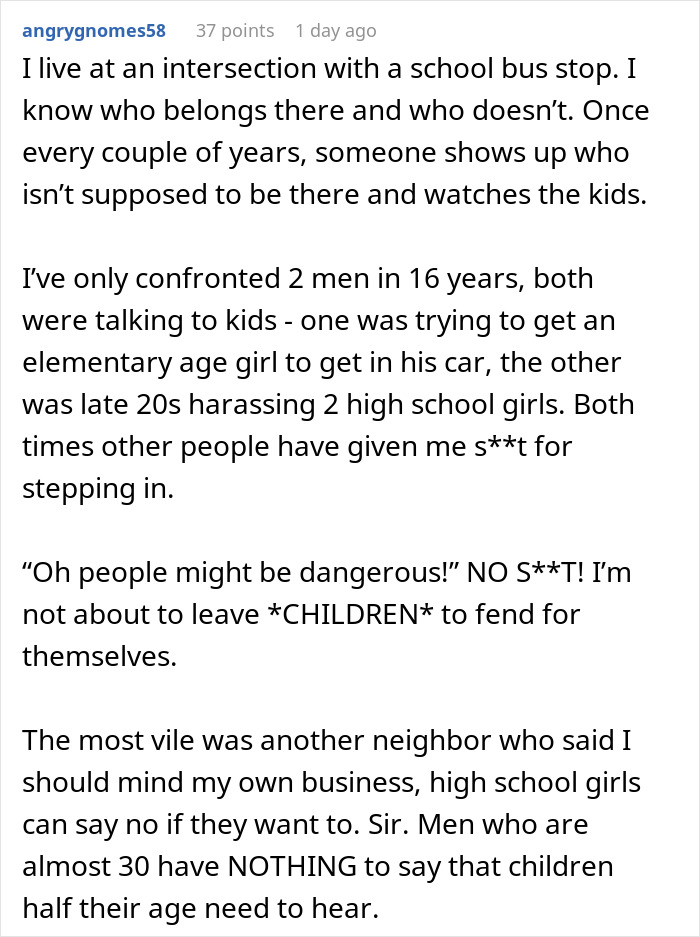(Un)willingness to help other people can tell a lot about a person. Sometimes, the way they react in a certain situation can make you see them in a different light completely, for better or worse.
That’s what happened with this redditor and her boyfriend. They were waiting for their ride after a Christmas party when the OP saw a woman standing alone on the street and a drunken guy wandering around her. The redditor didn’t hesitate to come to her help and make sure she got into her car okay, but her boyfriend didn’t seem as keen to help, which significantly influenced the way she saw him after that. Scroll down to find the full story in her own words below.
It’s important not to turn a blind eye when someone might be in need of help

Image credits: GaudiLab / Envato (not the actual photo)
This couple saw a woman standing alone on the street and a drunken guy next to her, but only one of the partners decided to come to her help









Image credits: Image-Source / Envato (not the actual photo)


Image credits: Prefer2beanon2
Every month, billions of people find themselves having to ask strangers for help

Image credits: Image by Freepik (not the actual photo)
Most of us know that we can trust our close friends and family. But can we trust strangers to lend a helping hand when we need it the most? That seems to be a matter of luck as you never know what kind of people are roaming the same areas that you do.
You might be happy to learn that, according to the World Giving Index, billions of people help someone they don’t know every month. The 2014 edition of the report found that back in 2013, for instance, as many as 2.3 billion worldwide did, marking a 226 million increase since 2012.
The report noted that men were more likely than women to help strangers, though other studies suggest that empathy in everyday life is higher for women rather than their male counterparts. According to the World Giving Index, the age group ranging from 30 to 49 years of age is the most likely to help a stranger.
Another study, carried out by researchers from UCLA (University of California, Los Angeles), Australia, Ecuador, Germany, the Netherlands, and the UK, found that people around the world signal strangers for assistance every couple of minutes, and the “requests for assistance are very frequent and mostly successful; and when people decline to give help, they normally give a reason.”
The bystander effect may or may not have something to do with people’s lack of helpfulness when someone’s in trouble, opinions differ

Image credits: teksomolika / Freepik (not the actual photo)
When the woman on the street approached the OP and her boyfriend, asking if she could stay with them for a moment, the redditor didn’t hesitate to say yes. She saw that the person was in an unfavorable situation and wanted to make sure she got out of it safely. However, her boyfriend wasn’t on the same page, or at least wasn’t equally willing to act on it; and some redditors saw why – being confrontational as a man and a woman is not always received the same way.
But it’s not only fears for one’s safety (which aren’t always unfounded) that keep some people from helping others. Sometimes the phenomenon known as the bystander effect does. Making people act oblivious to the misfortune of others, the phenomenon refers to people refraining from helping others—be it providing medical aid, stopping a bully, or anything else—when they are in the presence of other people. Some sources suggest that the greater the number of bystanders is, the less likely one of them is to provide help to someone in need.
According to Medical News Today, due to the bystander effect, “People may freeze, become apathetic, avoid a plea for help, or ignore an emergency in the presence of other onlookers or bystanders.” The aforementioned source also referred to a research program from the ‘60s, which found that while any participant who was the sole bystander at the moment helped someone in need, only 62% did when they were part of a larger group.
But despite numerous sources citing the seemingly obvious presence of the bystander effect, recent studies seem to have disproved that the phenomenon is stopping people from helping others. An international team of researchers used CCTV video systems to examine 219 aggressive public conflicts in Amsterdam (The Netherlands), Lancaster (the United Kingdom), and Cape Town (South Africa) and found that in as much as 91% of situations a bystander, or multiple bystanders, intervened in the public conflict.
While the OP intervened, too, when she saw a woman in trouble, her boyfriend didn’t, which made her see him in a different light. After reading her story, some netizens sided with her, but others weren’t so quick to judge the boyfriend’s reaction and suggested that it was the way that it was for a reason. The netizens shared their opinions in the comments.
Some netizens sided with the OP








Others said it wasn’t smart of her to confront the drunken man








People shared similar stories, too











